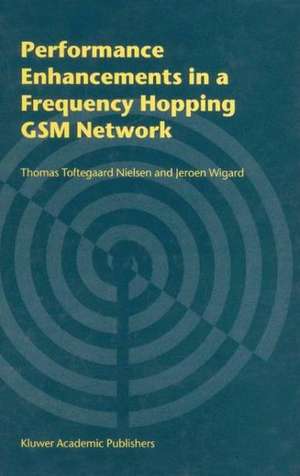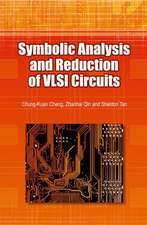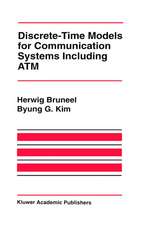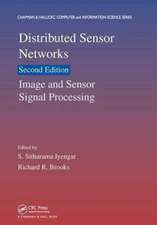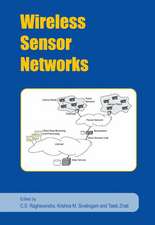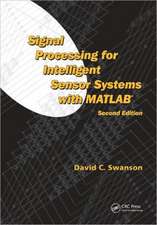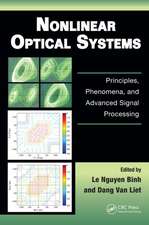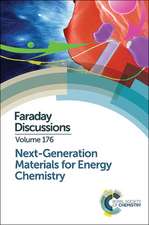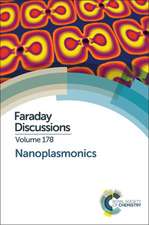Performance Enhancements in a Frequency Hopping GSM Network
Autor Thomas Toftegaard Nielsen, Jeroen Wigarden Limba Engleză Paperback – 30 noi 2010
Performance Enhancements in a Frequency Hopping GSM Network covers FH and some of the additional features in detail. It begins with an in-depth description of the basic concept of FH on link level as well as on system level. Different methods have been used for analysis, such as link level simulations, network level simulations and classic tele-traffic theory.
Special features of Performance Enhancements in a Frequency Hopping GSM Network:
- Combines the practical experiences of operator and vendor with more theoretical research methods. An in-depth treatment of prevailing problems in GSM networks;
- Presentation of a new method, computer-aided network design (CAND), which has been developed to analyse the complex network structures of a GSM network. CAND provides the possibility for more realistic performance evaluations than conventional methods;
- Provides GSM-specific analysis of functionality improvements in power control, discontinuous transmission, and several handover algorithms;
- Explanation of the quality and capacity gains of features like the combination of FH and reuse partitioning, referred to as intelligent frequency hopping;
- A frequency planning method for FH GSM networks is presented. This method exploits the benefits from FH directly in the allocation process, increasing the overall frequency plan.
| Toate formatele și edițiile | Preț | Express |
|---|---|---|
| Paperback (1) | 947.18 lei 6-8 săpt. | |
| Springer Us – 30 noi 2010 | 947.18 lei 6-8 săpt. | |
| Hardback (1) | 953.52 lei 6-8 săpt. | |
| Springer Us – 29 apr 2000 | 953.52 lei 6-8 săpt. |
Preț: 947.18 lei
Preț vechi: 1155.11 lei
-18% Nou
Puncte Express: 1421
Preț estimativ în valută:
181.24€ • 189.74$ • 149.97£
181.24€ • 189.74$ • 149.97£
Carte tipărită la comandă
Livrare economică 05-19 aprilie
Preluare comenzi: 021 569.72.76
Specificații
ISBN-13: 9781441949769
ISBN-10: 1441949763
Pagini: 352
Ilustrații: XIV, 334 p.
Dimensiuni: 155 x 235 x 18 mm
Greutate: 0.49 kg
Ediția:2002
Editura: Springer Us
Colecția Springer
Locul publicării:New York, NY, United States
ISBN-10: 1441949763
Pagini: 352
Ilustrații: XIV, 334 p.
Dimensiuni: 155 x 235 x 18 mm
Greutate: 0.49 kg
Ediția:2002
Editura: Springer Us
Colecția Springer
Locul publicării:New York, NY, United States
Public țintă
ResearchDescriere
Due to the explosive global growth in the number of mobile subscribers, as well as the growth predicted in the mobile data segment, the need for improved spectrum efficiency on the radio interface becomes more and more important. Frequency hopping (FH) is an effective method for improving the spectrum efficiency. One of the advantages of FH is that it can be combined with other spectral efficiency improving features like power control, handover and reuse partitioning.
Performance Enhancements in a Frequency Hopping GSM Network covers FH and some of the additional features in detail. It begins with an in-depth description of the basic concept of FH on link level as well as on system level. Different methods have been used for analysis, such as link level simulations, network level simulations and classic tele-traffic theory.
Special features of Performance Enhancements in a Frequency Hopping GSM Network:
Performance Enhancements in a Frequency Hopping GSM Network covers FH and some of the additional features in detail. It begins with an in-depth description of the basic concept of FH on link level as well as on system level. Different methods have been used for analysis, such as link level simulations, network level simulations and classic tele-traffic theory.
Special features of Performance Enhancements in a Frequency Hopping GSM Network:
- Combines the practical experiences of operator and vendor with more theoretical research methods. An in-depth treatment of prevailing problems in GSM networks;
- Presentation of a new method, computer-aided network design (CAND), which has been developed to analyse the complex network structures of a GSM network. CAND provides the possibility for more realistic performance evaluations than conventional methods;
- Provides GSM-specific analysis of functionality improvements in power control, discontinuous transmission, and several handover algorithms;
- Explanation of the quality and capacity gains of features like the combination of FH and reuse partitioning, referred to as intelligent frequency hopping;
- A frequency planning method for FH GSM networks is presented. This method exploits the benefits from FH directly in the allocation process, increasing the overall frequency plan.
Cuprins
Preface. Acknowledgements. 1. Introduction. 2. Performance Enhancing Strategies and Evaluation Methods. 3. A Brief Introduction to the GSM System. 4. Link Modelling and Link Performance. 5. Computer Aided Network Design. 6. Influence of FH on a GSM System. 7. Power Control and DTX in a FH GSM System. 8. Handover Algorithms in a GSM System. 9. Combining Reuse Partitioning and Frequency Hopping in a GSM Network. 10. Frequency Planning of Frequency Hopping Networks. References. Index.
